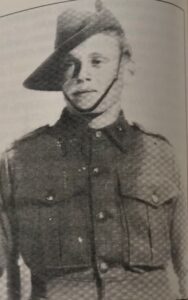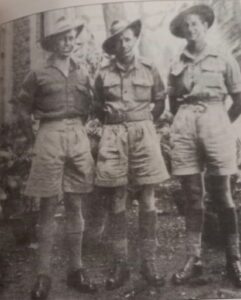Ian Spoule
(1922-2001)
2/32 Australian Infantry Battalion
Ian was only 18 when he decided to enlist on his birthday on 25 March 1940. While waiting in line, he met Jack Powling (“China”), who became his closest companion in the following years.
Ian left Sydney on the Queen Mary to reach Palestine and was eventually captured in Libya on 16 July 1942.
We were handed over to the Italians since we had been captured in their territory and were destined to a supposed oblivion as prisoners of war. Was that really the last I would see of the battlefield? I could not imagine, even in my wildest dreams, what was waiting for me in the following years.

Ian in 1940Source: L. Oates, I. Sproule, Partigiani australiani
On 17 August 1942, Ian was transferred from Benghazi to Bari and then to PG 57, Grupignano, where he remained for about six months, suffering from the cold and the lack of food: «I had learned not to give up in any circumstance. Now that things had taken a downturn, I was determined not to give in.»
On 25 April 1943, with more than 40 Australian and New Zealander PoWs, Ian was taken to PG 106, Vercelli, a prison camp divided into multiple sub-camps.
Ian and China were led to the work camp of Cascina Oschiena, where they worked in the rice fields together with «dozens of girls». It was there that, on 8 September, they learned of the Armistice. They decided to leave the camp and try to reach the nearby mountains. During their first stop in a village teeming with escaped PoWs, they barely escaped a German mop-up operation. After resuming their journey, they reached the village of Graglia and knocked on the door of one of the houses:
The first door we knocked at brought us a kind-looking man who was in his mid-forties. We learned he was called Davide [his real name was Egidio Rocchi]. He did not hesitate, as he knew perfectly who we were [PoWs]. He brought us inside and gave us a piece of salame and a small piece of bread. «The Germans took the rest», he explained. «You are safe. The Germans don’t come often. I will give you a bed and find you food.» […] Davide and his wife always had a small meal to share with us. We felt overwhelmed by the trust and generosity of this man and his family.
Since the Germans soon started to visit Graglia more often, looking for escaped PoWs, Ian and China, fearing that they might endanger their guests, decided to go down the valley. They soon met Elda, a young local girl who, with her family, took them in. It did not take long for Ian to fall for her.
We had a relationship of harmony, trust, and love. It was only ruined by external forces which kept us apart. It was a wartime relationship. […] Each evening, when we left each other, we did not know if we would meet again. I could be captured as an escaped prisoner of war; she could be shot because she helped me.
Soon, they decided to leave this hideout as well, as they feared for Elda and her family. They decided to look for a partisan band to join it and continue to fight. It was precisely Elda who put them in contact with some partisans living in the area.
While he did not share the Communist convictions of the partisans[1], the two felt they had no choice but to stay. Their decision was reinforced by the Germans, who spread posters calling for escaped PoWs to surrender and doubling the bounty on their heads. Due to these posters, many escaped Allied PoWs joined the band in the following weeks, even though they did not stay for long. The Australians constituted the most permanent group: besides Ian – who was there because he did not want to leave Elda – there were China, Happy Hungerford, Bill Smith, Ray Vigar, and Norm Willacott. Sometime later, they were joined by Bert Waineswright, who had escaped from four different prison camps. After Christmas 1943, the Australians became nine, as two members of Ian’s battalion joined the band, Leslie (“Les”) Parker and Ken Scott.
We were all Privates. As a result, while we did not have a Commanding Officer, we were all able to devise a plan and execute it. During those months, we became a small, close, and efficient group. We were all veterans of Tobruk and El Alamein. It is a testament to our training that we could act successfully without an experienced officer’s guidance.
Initially, the partisans did not trust us and, consequently, did not consult us. They knew we were not Communists but also that we were the only ones with military training. […] We faced a dilemma during the initial weeks: how to move around to save our skin, remain loyal to the “hierarchy,” and preserve our personal convictions.
As Ian recalled, political ideals did not motivate his and his companions’ participation in the partisan war. Instead, they were motivated by the need to find a hideout that would not endanger the population and allow them to continue fighting. Therefore, their relationship with the Italians was conflictual. A mutual lack of understanding hamstrung the two groups. They did not understand each other’s language or share similar political inclinations. Moreover, the partisans, by large, were not versed in military tactics and, to the PoWs, indulged in often excessive acts of violence.
In May 1944, the Germans launched a vast anti-partisan operation in the Biella-Ivrea area. Ian’s group responded by ambushing the enemy at the Torrazzo crossroad. It was an Australian, Ian Parker, who threw the hand grenade that killed four German officers. The Germans and the Fascists, on reprisal, decided to concentrate their effort in the Serra area, where Ian’s band operated. Ian and his companions managed to escape the manhunt only by hiding in a ravine.
We remained hidden while the Germans were mopping up the mountain, burning many places where we partisans used to hide. In the end, they left carrying many prisoners with them, including China. My best friend, always with me since we had enlisted together on the same day, was no longer by my side.
After the enemy attack, since they lacked weapons and ammunition, the band decided to make a night incursion in the village of Issime in the Lys Valley. Four Australians and thirty Italians took part in the raid, which failed because of the partisans’ lack of coordination and the arrival of Fascist troops from Lillianes. During the escape, Ian was almost hit by a mortar shell, which wounded his companion Les, who died of infection sixteen days later.
Les’s death was a blow for us. Until then, we Australians had avoided death almost every day. We acted together, and teamwork and camaraderie bound up tightly. It was intolerable, now, that one of us would die.
At the end of the summer of 1944, the partisans learned that the Aosta Valley was operating a pro-British group, which could provide the escaped PoWs with some guides to cross Monte Bianco so that they could reach recently-liberated France.
The Australians, who were waiting for such an opportunity, decided to leave immediately. Ian also decided to go with them, as the others had convinced him to go, despite his hesitation about leaving Elda. He left without meeting her, leaving a goodbye letter.
These were interminable days. The journey was as monotonous as a conveyor belt, with each day fading into the next. We marched up and down, one day after the other. Around the fourth day, it started to snow, big snowflakes that slapped you on the face, blinding and freezing you to your core. […] Our guide, on his skis, could go ahead without difficulties, but for us[2] it was a nightmare.
I was oppressed by a deep sorrow. I knew Elda was waiting for me one night after the other and that I would not come one night after the other. Until Norman would give her my letter, my absence would be mysterious and devastating. My clouded thoughts added to the physical fatigue I was experiencing.
The group took nine long days to cross the Alps in harsh conditions. They suffered from hunger, cold, insufficient clothing, and an avalanche which fell a few metres from the group, almost burying them. Finally, they began their descent, as Ian and his companions were approaching their limit:
For a while, we did not see any sign of life. We went through a completely empty stone village. Then, up and down for another day. We were headed towards what looked like a big black snake way below us, which, in reality, was a piece of road clean of snow. When we reached it, we collapsed, unable to walk on hard ground. After a while, we heard the sound of an engine, and soon, an American jeep arrived, and the window lowered. In the front seat was an officer with his foot on the dashboard and a cigar in his mouth. He jumped down from the jeep and shouted: “Hey boys! I would think you’re happy to see me!”

Ian (on the left) on leave in Bombay during his return voyage to Australia, 1945Source: L. Oates, I. Sproule, Partigiani australiani
.
Ian recalled the effort it required him, in the following months, to get used again to be “on the right side” and return to his lifestyle after three years.
He returned to Australia on 28 March 1945, always keeping in touch with his escape companions.
He also kept thinking about Elda and the injustice she suffered because of him. Finally, after many years of silence, he was able to contact her in the latter part of their lives.
Camps related to this story
Sources
L. Oates, I. Sproule, Partigiani australiani nel biellese. Una storia vera d’amore e di guerra, Tipografia Baima & Ronchetti, Castellamonte-Torino, 2017. Ed. orig. Australian Partisan. A true story of love and conflict, written by Lynett Oates with Ian Sproule, Australian Military History Publication, 1997.
M. Soggetto, Braccati. Prigionieri di Guerra alleati in Piemonte e Valle d’Aosta, Aviani e Aviani editori, Udine, 2013.
M. Tenconi, Prigionia, sopravvivenza e Resistenza. Storie di australiani e neozelandesi in provincia di Vercelli (1943-45) in «L’Impegno», a. 28, 1 giugno 2008.
Notes:
[1] It was the Nino Bixio detachment of the 2nd Biella Brigade.
[2] The group comprised Australians, New Zealanders, and British escaped PoWs, and numbered around 20-30 men..
